|
|
|
Sort Order |
|
|
|
Items / Page
|
|
|
|
|
|
|
| Srl | Item |
| 1 |
ID:
104790
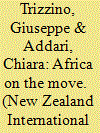

|
|
|
| 2 |
ID:
128054
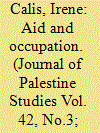

|
|
|
|
|
| Publication |
2013.
|
| Summary/Abstract |
This article foregrounds how international aid and the Israeli occupation intersect in the historically prosperous West Bank agricultural village of Jayyus; with most of its lands isolated behind the Israeli Wall, Jayyus is now aid-dependent. While material aid plays a larger role in sustaining the village, it is through "advocacy work" (a form of international aid largely unaddressed in the literature) that Jayyusis experience aid on a daily basis. The article examines the paradoxes of dependence and subordination seen from the vantage point of local communities under the jurisdiction of an occupying power and in the absence of a sovereign Palestinian state. Also shown is how the routinization of aid both obscures the ongoing status of occupation and has become an important mechanism that sustains it.
|
|
|
|
|
|
|
|
|
|
|
|
|
|
|
|
| 3 |
ID:
060723
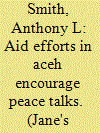

|
|
|
| 4 |
ID:
155440
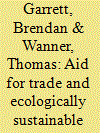

|
|
|
|
|
| Summary/Abstract |
In September 2015, Australia, along with 193 member states of the United Nations, signed the United Nations Sustainable Development Goals. The facilitation of international trade and increasing foreign aid for developing countries were emphasised as crucial means for achieving the Sustainable Development Goals. An important role was assigned to the international Aid for Trade initiative, which is about stimulating economic growth in developing countries through removing constraints to trade. Australia has been a strong supporter of the Aid for Trade initiative since it was launched at the World Trade Organization’s Ministerial Conference in Hong Kong in 2005. Aid for trade has become a central plank of the ‘new development paradigm’ of Australia’s international aid program. This article analyses the conceptualisation and practice of aid for trade in Australia’s aid, with a focus on how it links to ecologically sustainable development. It argues that Australia’s aid for trade is reinforcing the neo-liberal development paradigm in which environmental dimensions are overall neglected and private sector development and free trade are prioritised. In order to achieve international and national development goals of poverty reduction and sustainable development, environmental sustainability needs to be fully integrated into the growing aid for trade portfolio of Australia’s international aid.
|
|
|
|
|
|
|
|
|
|
|
|
|
|
|
|
| 5 |
ID:
082012


|
|
|
|
|
| Publication |
2008.
|
| Summary/Abstract |
Bono's launch of Product (red)™ at Davos in 2006 opens a new frontier for development aid. With the engagement of companies such as American Express, Converse, Gap and Emporio Armani, and now Hallmark, Dell and Microsoft, consumers can help hiv/aids patients in Africa. Aid celebrities-Bono, Jeffrey Sachs and Paul Farmer-guarantee the 'cool quotient', the management and the target of this new modality of aid. red functions using the guarantee of celebrity together with the negotiated representation of a distant 'Africa' to meet competing, and perhaps incommensurable, objectives. A 'rock man's burden'-imagined along familiar constructions of sex, gender, race and place-frames African beneficiaries' receiving process. At the same time, red depicts consumer-citizens as fashion-conscious yet actively engaged and ethically reflexive. red rescues international aid from its dour predictive graphs and disappointing 'lessons learnt' and spins it as young, chic and possible. By masking the social and environmental relations of trade and production that underpin poverty, inequality and disease, red reconfigures the world of possibility in what might otherwise be rationally impossible ways.
|
|
|
|
|
|
|
|
|
|
|
|
|
|
|
|
| 6 |
ID:
061667
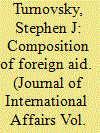

|
|
|
| 7 |
ID:
128886


|
|
|
|
|
| Publication |
2013.
|
| Summary/Abstract |
Without much attention to local context, global health policy experiments are being conducted on vulnerable indigenous populations. This article details the history of a development-bank-funded experiment to contract out public health services in Cambodia's north-eastern province of Ratanakiri. The case study highlights the difficulties that flow from improper planning and implementation, as well as the distorting effects that narrowly defined contract performance measures can have on the health of the population as a whole. Progress in global health will not be possible if local context and voices continue to be underappreciated.
|
|
|
|
|
|
|
|
|
|
|
|
|
|
|
|
| 8 |
ID:
085676
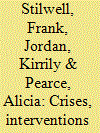

|
|
|
|
|
| Publication |
2008.
|
| Summary/Abstract |
Crises and interventions often generate opportunities for profitable business activities. This can have a significant effect on the outcomes of interventions. This article explores how economic interests can create crises and how the nature of interventions may be shaped by business interests. It looks further at the macroeconomic consequences of crises, the possibilities of corruption and neo-imperialism. Reference is made to examples of crises and interventions that illustrate these political economic concerns.
|
|
|
|
|
|
|
|
|
|
|
|
|
|
|
|
| 9 |
ID:
121115
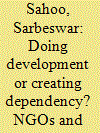

|
|
|
|
|
| Publication |
2013.
|
| Summary/Abstract |
This paper examines the role of non-government organisations (NGOs) and the implications for democratisation in India. By analysing one such organisation, this paper argues that NGOs do not always contribute positively to the democratisation process. It shows how Seva Mandir, an NGO working in the tribal areas of Rajasthan, has adopted a purely technocratic and apolitical service delivery approach and promoted a neo-liberal model of development. The unintended consequence of promoting this model has been the growth of a culture of 'organised dependency' at the grass-roots level, which has adversely affected the larger objectives of empowerment and democratisation.
|
|
|
|
|
|
|
|
|
|
|
|
|
|
|
|
| 10 |
ID:
142624


|
|
|
|
|
| Summary/Abstract |
This article explores the interplay between international donors and local NGOs in Kyrgyzstan's HIV/AIDS sector. It argues that donors have transposed ready-made policies without sufficient consideration of the local context and that NGOs have responded strategically, adapting their proposals and reports to the expectations of donors. This complex interplay has resulted in unintended consequences that have undermined an effective response to the HIV/AIDS epidemic. It has given rise to ‘virtual realities’ detached from developments on the ground. The funding system has also led to corruption and misappropriation of funds and the failure of NGOs to become sustainable. Largely bypassing the state in the allocation of funds, international donors have also undermined an already weak state.
|
|
|
|
|
|
|
|
|
|
|
|
|
|
|
|
| 11 |
ID:
119890
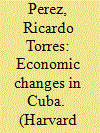

|
|
|
|
|
| Publication |
2012.
|
| Summary/Abstract |
For over 50 years, a heated debate has raged over developments in Cuba, dealing with everything from ideology, politics, and the economy to independence and sovereignty. Today, transformations taking place on the island have inspired a renewed interest in the country.
|
|
|
|
|
|
|
|
|
|
|
|
|
|
|
|
| 12 |
ID:
131373
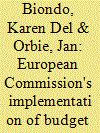

|
|
|
|
|
| Publication |
2014.
|
| Summary/Abstract |
The complex relationship between democracy and development has been extensively discussed in academic literature. However, we do not have much knowledge of how this translates into donor practices. How does the European Commission (EC) deal with tensions arising from promoting democracy and development? To answer this question, this article operationalises the distinction between 'democracy promoters' and 'developmental donors', focusing specifically on budget support and governance incentive tranches. Empirically we examine the implementation of the EC's budget support and Governance Incentive Tranche in Ethiopia (2005-10), a case where the dilemma between democracy promotion and development cooperation is particularly strong. Investigating the position of the EC along the democracy promoter versus developmental donor continuum, we conclude that the EC's position lies between these extremes. However, in the case of budget support, a shift has been made away from the Commission being a democracy promoter and towards the role of developmental donor.
|
|
|
|
|
|
|
|
|
|
|
|
|
|
|
|
| 13 |
ID:
116856
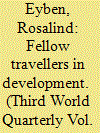

|
|
|
|
|
| Publication |
2012.
|
| Summary/Abstract |
Although what has been called 'the people-centred development decade' of international aid in the 1990s can be explained at the systemic level by the end of the Cold War, such an account does not tell us how it actually came about. This article argues that a contributory factor can be identified through the life-histories of a generation of development semi- professionals, women now in their sixties who were caught up and part of two great emancipatory moments in the second half of the 20 century: freedom from colonialism and women's liberation. These shaped their consciousness and produced political effects that gave them the opportunity to influence development practice. That they were able to make use of that opportunity is attributed to their versatility and entrepreneurship, developed through a force of circumstance that had given them an education but denied them the traditional career path taken by their male peers.
|
|
|
|
|
|
|
|
|
|
|
|
|
|
|
|
| 14 |
ID:
177191
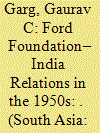

|
|
|
|
|
| Summary/Abstract |
This paper investigates the development of a close relationship between the Ford Foundation—the world’s richest and most internationally oriented philanthropic organisation in the Cold War era—and India in the 1950s. Unlike existing literature on private foundation–recipient country relationships, which overwhelmingly focusses on the donor perspective, this essay explores the recipient perspective, thereby contributing to the emerging literature on Third World agency in international politics. Complicating the idea that recipient countries were overwhelmingly interested in aid maximisation, this article shows that India moved closer to the Ford Foundation in order to fulfil diplomatic rather than aid-related objectives.
|
|
|
|
|
|
|
|
|
|
|
|
|
|
|
|
| 15 |
ID:
128982
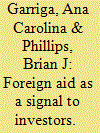

|
|
|
|
|
| Publication |
2014.
|
| Summary/Abstract |
Does development aid attract foreign direct investment (FDI) in post-conflict countries? This article contributes to the growing literature on effects of aid and on determinants of FDI by explaining how development aid in low-information environments is a signal that can attract investment. Before investing abroad, firms seek data on potential host countries. In post-conflict countries, reliable information is poor, in part because governments face unusual incentives to misrepresent information. In these conditions, firms look to signals. One is development aid, because donors tend to give more to countries they trust to properly handle the funds. Our results show that aid seems to draw FDI-however, this is conditional on whether the aid can be considered geostrategically motivated. We also show that this effect decreases as time elapses after the conflict. This suggests that aid's signaling effect is specific to low-information environments, and helps rule out alternative causal mechanisms linking aid and FDI.
aid
|
|
|
|
|
|
|
|
|
|
|
|
|
|
|
|
| 16 |
ID:
046658
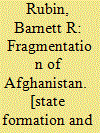

|
|
|
|
|
| Edition |
2nd ed.
|
| Publication |
New Haven, Yale University Press, 2002.
|
| Description |
xlv, 378p.pbk
|
| Standard Number |
0300095198
|
|
|
|
|
|
|
|
|
|
|
|
Copies: C:1/I:0,R:0,Q:0
Circulation
| Accession# | Call# | Current Location | Status | Policy | Location |
| 045811 | 958.1/RUB 045811 | Main | On Shelf | General | |
|
|
|
|
| 17 |
ID:
066972
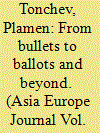

|
|
|
| 18 |
ID:
125309
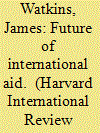

|
|
|
|
|
| Publication |
2013.
|
| Summary/Abstract |
By 2015, we will have nearly eradicated extreme poverty and hanger throughout the world by halving the proportion of people living on under $1.25 per day. We will have achieved universal primary education worldwide, reduced child mortality rates by two thirds, and halted and reversed the spread of HIV/AIDS, malaria and other diseases. We will have promoted gender equality, improved maternal health, and ensured environmental sustainability. Or at least, this is the promise that we made to ourselves, and to each other, almost 15 years ago.
|
|
|
|
|
|
|
|
|
|
|
|
|
|
|
|
| 19 |
ID:
129203


|
|
|
|
|
| Publication |
2014.
|
| Summary/Abstract |
The Global Fund to Fight AIDS, Tuberculosis, and Malaria is one of the world's largest funders of global health programs. From 2002 to 2011, the Global Fund disbursed about US$15.5 billion to support programs aiming to prevent and treat the three diseases, to care for the people suffering from them, and to strengthen health systems in more than 150 low- and middle-income countries. At its replenishment meeting this December, the Global Fund pledged $12 billion to supporting programs through 2016. Yet, while the Global Fund has made important contributions to the fight against AIDS, tuberculosis, and malaria over the past decade, each year over 3 million people still die from these three diseases. Millions more suffer from extended periods of sickness. Only about half of people eligible for anti-retroviral (ARV) medicines in developing countries actually enroll in treatment. It is therefore worth remembering that the same moral imperative that drove the creation of the Global Fund over a decade ago also compels the Fund and its partners to do whatever they can to ensure that the billions of dollars the Fund raises and disburses reduce the disease burden as efficiently as possible
|
|
|
|
|
|
|
|
|
|
|
|
|
|
|
|
| 20 |
ID:
121780
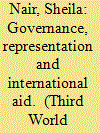

|
|
|
|
|
| Publication |
2013.
|
| Summary/Abstract |
The growth of the postwar 20th century international aid architecture has generated much debate over the successes and failures of aid, its changing forms and its challenges. This article uses this aid landscape to explore the representational or discursive power and authority of the aid donor over the aid recipient. It suggests that representations about what aid does, its modalities and dispensations reproduce a hegemonic discourse and that representational authority in diagnosing aid's problems and prescribing solutions resides generally on one side of the aid binary. It thus focuses on the hierarchical or asymmetric relations of power implied by such a binary, on the way development aid in particular has come to shape self-understandings of donors in relation to recipients, and on the discursive labour that enables such a construction. It also explores how the post-Washington consensus on poverty eradication has embedded neoliberal solutions to development. The reproduction of the hegemonic aid discourse is examined in reference to NGOs involved in the dispensing of aid in Southeast Asia by drawing on scholarly literature and field research in Southeast Asia and Washington DC.
|
|
|
|
|
|
|
|
|
|
|
|
|
|
|
|
|
|
|
|
|